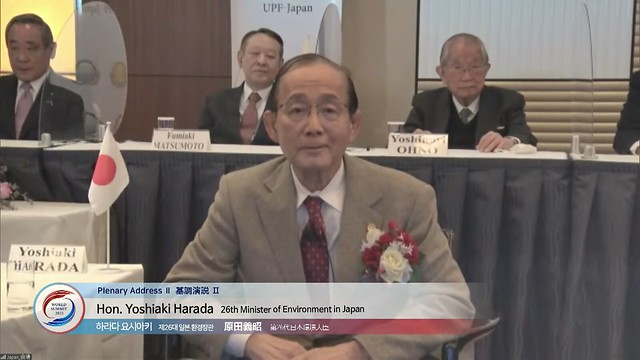Seoul, South Korea—A congratulatory performance by singer Min Woo-hyeok took place, followed by a speech by Hon. Yoshiaki Harada, Minister of the Environment (2018-2019), Japan, who said that members of the IAPP Japan—an officially registered caucus for Diet members—had gathered in order to contribute to the World Summit 2022. He believes that, currently, the biggest threat to the peace and security of Northeast Asia—which includes Japan and the Korean Peninsula—is China’s desire to achieve hegemony in Asia. Japan is worried about a possible contingency in Taiwan, possibly within three to four years, which would be an emergency for Japan and for the Japan-U.S. security alliance. Japan’s constitution, which has remained unchanged for 75 years, must be revised in accordance with the current geopolitical situation. Article 9 bans the formation of armed forces, while in reality, its self-defense forces have served as de facto military. Japan cannot overlook China’s military ambitions and human rights abuses towards Tibetans and Uighurs. Japan is also concerned about the division of the Korean Peninsula, even though it does not have a specific policy to help the unification process. One more concern for Japan is North Korea’s missile launchings. Japan and the United States have affirmed the importance of a free and open Indo-Pacific region. Japan is a member of the QUAD, a strategic security dialogue between the U.S., India, Japan and Australia, which aims to deter Chinese aggression. Hon. Harada hopes South Korea will join the dialogue and promises to be committed to improving bilateral relations between his country and South Korea, which, regretfully remain politically strained.
Hon. Chuichi Date, President of the House of Councillors (2016-2019), Japan, said the social distancing requirements and stringent international travel restrictions due to COVID have created interpersonal isolation and a weakening of international relations more than any time in history. However, thankfully the co-founders of UPF have now ushered in an age that requires a spirit of interdependence, mutual prosperity and universal values. The situation of the Korean Peninsula where the interests of the stronger global powers are intertwined can only be resolved through these exact principles and spirit. In fact, through this we can see the Korean Peninsula as a microcosm of the world and a great lesson for how to build global peace. Most importantly, communication and cooperation between the North and the South must be encouraged to build a relationship of trust. Also, Japan welcomes a peaceful unification on the Korean Peninsula, as it would also solve the problems it has with the DPRK, such as the nuclear missiles and kidnapping of Japanese citizens.
H.E. Ehud Olmert, Prime Minister (2006-2009) of Israel, who has attended many conferences of this nature, noted that there is great consensus on what must be safeguarded. Everyone from East and West, from right and left, is in favor of peace, friendship, relaxation and mutual respect. The question is not what we are for, but what are we prepared to do in order to make it possible. Different stakeholders in pursuit of peace, may have ideas that are not congruent with each other. This does not mean, however, that they are completely mistaken. Those who are seriously committed to peace must be prepared to find solutions that are not quite what they originally had in mind, but that can bring negotiators closer together. He believes there is only one possible solution to the conflict on the Korean Peninsula, i.e., a dramatic change in the nature of the DPRK. The ROK will automatically become their role model, and there is only one way they will become part of it, by changing their way of life, their government, and by becoming a free society, which they are not now. South Korea can be absolutely confident that it will be defended, supported and strengthened by all peace-loving people in the world.

